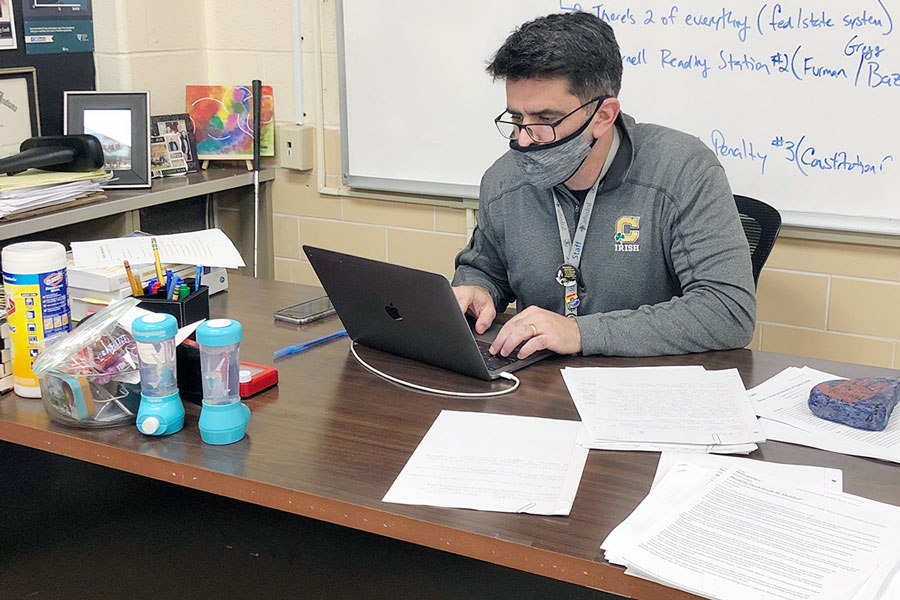Wage increase would benefit students with jobs
Two seniors note how a change would add to their savings
Social studies teacher Mr. Criag Blanchet said he sees both advantages and disadvantages if the federal minimum wage were to be raised to $15 an hour.
In between Covid death counts and vaccine rollouts, the past two years of political spectacle have featured numerous high profile politicians pledging their support — or disdain — for an increase in the minimum wage, typically to $15 per hour.
While the latest attempt was cut from a $1.9 trillion stimulus bill, which the House passed on March 10, the minimum wage will continue to be a direct link to Washington for many high school employees.
Senior Eric George works at Kroger as a utility clerk “meaning my job is either bagging groceries or bringing in carts from outside,” he said. George has worked regularly on the weekends since June 2019, with a brief hiatus due to the pandemic.
Senior Avery Rowe started working at Puccini’s Pizza & Pasta her sophomore year and makes minimum wage. “I started as a busser and now I work at the counter and answer phones,” she said. With the pivot to Covid-friendly policies, Rowe said occasionally she’ll work bussing shifts since the restaurant is focused on carry out.
George is paid $9.50 an hour, $2.25 more than Indiana minimum wage. “When you start working, you get $9, and every so often it goes up 50 cents,” he said.
George said that “admittedly” he has not thought much about the minimum wage. “I know Indiana minimum wage is $7.25 because of a big (Occupational Safety and Health Administration) poster at work,” he said.
Working now to pay later
With all his money channeled into a savings account, George said, “The idea (of raising the minimum wage) would appeal to me as someone who’s trying to make money to cover (future) student loan debt.” The Kroger employee is just fine with this, adding, “I’m not a very spontaneous buyer.”
If the minimum wage were raised higher than his current rate, George said that he could save more money for college, and even for big ticket items like a car. Mentally calculating, George said, “If raised in the near future, I could make about an additional 60 bucks with taxes. That’d be really nice.”
Rowe shared the sentiment, and said that on an individual level, “It’d be nice for me to make more money.”
After her semester of AP Macroeconomics, Rowe is familiar with what she called the “pros and cons to both sides” of the minimum wage debate. While she hasn’t formulated a particular stance, Rowe shares many economists’ caution and questions whether it would be the best move for the economy.
Since he wasn’t able to vote in the 2020 election, George said that while he doesn’t have many objections, he isn’t too informed. “I know people who own small businesses may feel much differently,” he said.
Like Rowe and George, many citizens (and many students for that matter) are familiar with the basics of the minimum wage debate. However, Mr. Craig Blanchet, an economics teacher, explained that the matter is fairly ingrained into American governance. “They’ve (raised) it so many times, with so many presidents, that it’s just a matter of time,” he said. Since 1938 when the country adopted a minimum wage, the rate has increased 22 times by 12 different administrations.
Bringing people out of poverty
Since President Franklin Delano Roosevelt, proponents of raising the minimum wage see the measure as synonymous with raising the standard of living. Increasing the hourly rate jives well with the American dream in particular because of the idea that “you’ll bring people out of poverty and into the working class,” Blanchet said.
Blanchet added that opponents will say that the government is merely raising incomes. With an increase in income, though, an increase in inflation would be likely to follow. Businesses would also face the possibility of reworking strategy to accommodate for fewer workers. And for some conservatives, the government shouldn’t be involved at all, and instead the invisible hand will adjust wages as needed.
Blanchet said, “I don’t know if I’m sophisticated to know if $15 is the magic number,” but that a raise is “long overdue.” Specifically, however, Blanchet wrote in an email, “If a minimum wage increase bill goes through within next two years, I’d prefer to see it at $12 per hour” or alternatively, “have a cost of living component that allows regional adjustment.”
“I think across both blue and red and every color of the political spectrum, the current level is not providing enough to get above poverty. I think most people would say that, but I’m not sure,” said Blanchet.
Supporting a minimum wage increase could be politically savvy for any party. Even though Democrats have recently been advocates of an increase, Blanchet said that Republicans, who often target the working class, could benefit as well. The main split may not end up being a fight against the status quo, but “the dollar amount of the raise,” he said.
However, incessant politicization and sequential polarization of the matter has not done much to help. Blanchet said that he did see the association between a Covid-relief bill and minimum wage, and while “it’s not a true pork belly thing” it still “bothers me as a citizen,” he said.
Any legislation that increases the minimum wage, he said, should stand alone. “For something that important, don’t try to package it with other legislation,” he said.

Andrew de las Alas is a senior and reporter for the Megaphone. He runs varsity cross-country, is co-captain of the speech and debate team and co-president...







